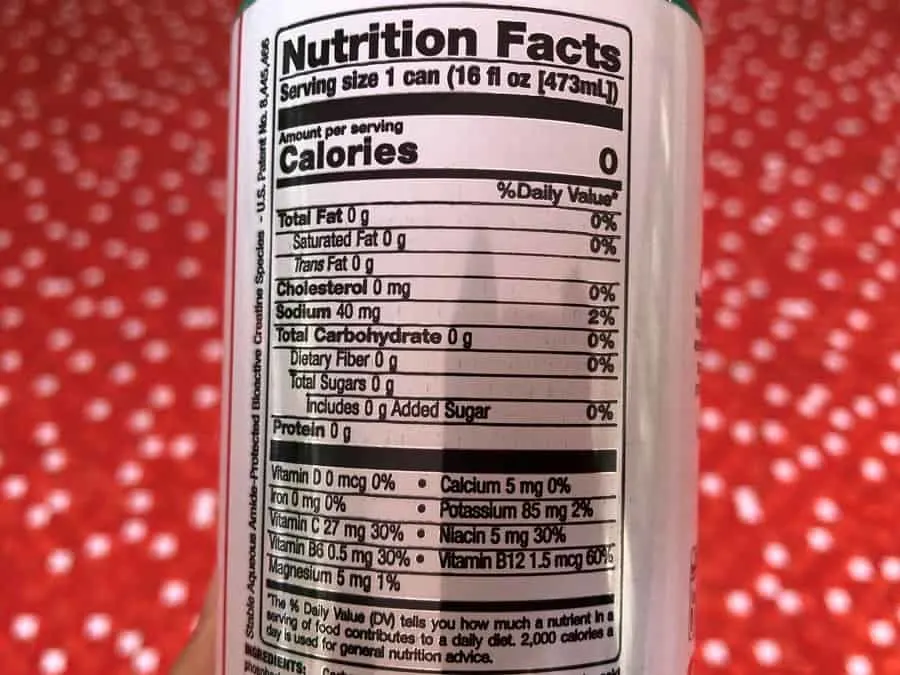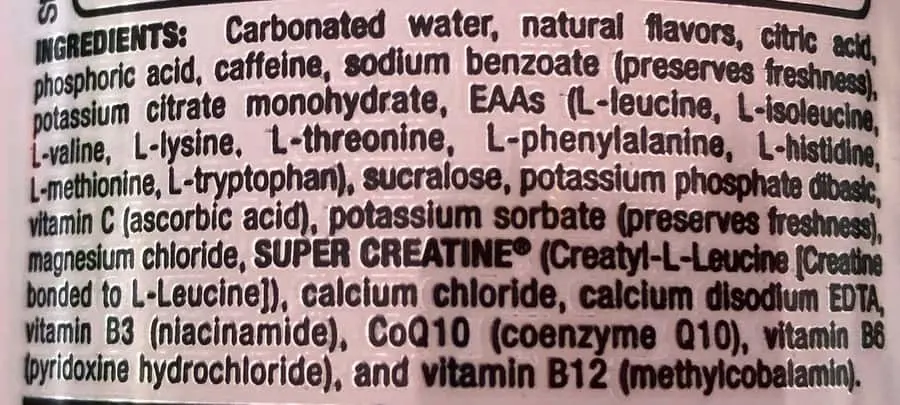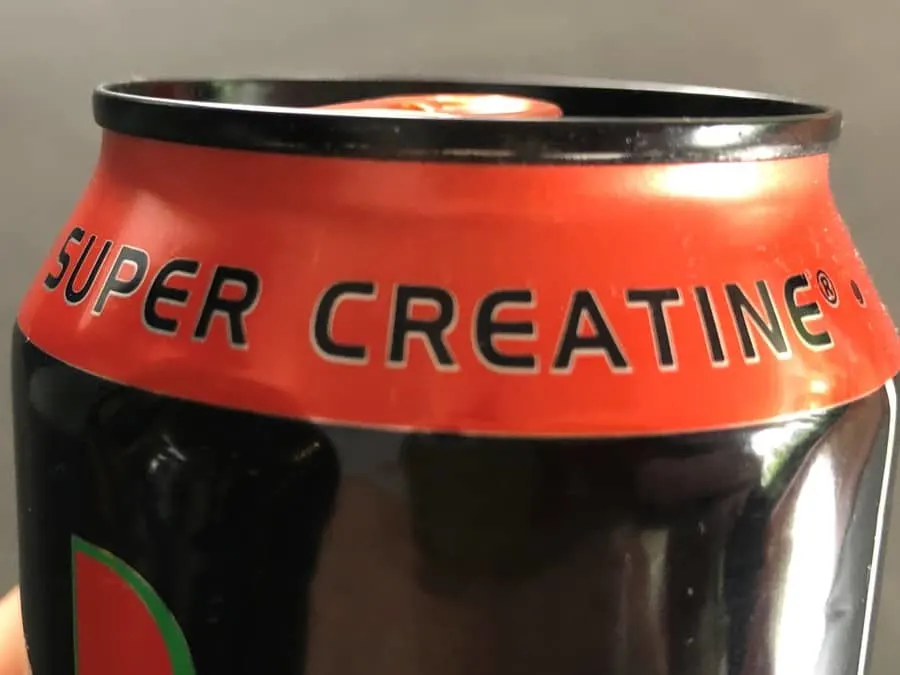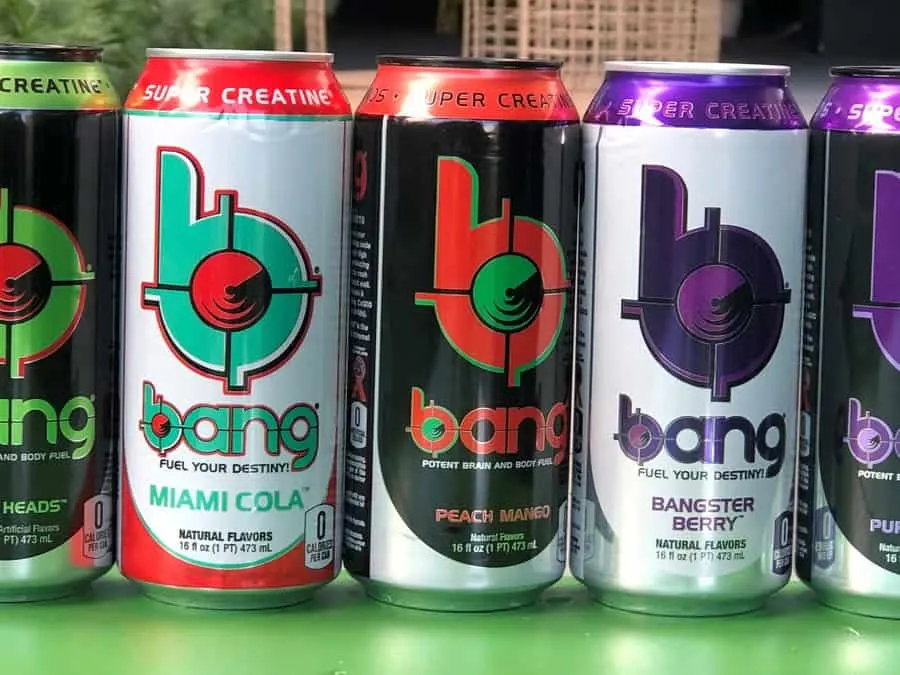Contrary to popular belief, energy drinks aren’t just sodas with added sugar and caffeine; they contain plenty of other ingredients that help to give you the energy boost you need to get through that afternoon slump
Bang Energy has one of the more prolific ingredients lists on the market, with everything from EAAs (Essential amino acids) to B-Vitamins. No expenses were spared in making Bang (and its price definitely reflects that).
Of course, just because it’s on the ingredients list, it doesn’t mean that the amount of any particular ingredient that’s present is actually effective, which brings us to Bang and its “Super Creatine” content.
To answer the question posed in the title, the creatine in Bang is bonded with L-Leucine, which isn’t the same as creatine on its own, making it difficult to tell if the creatine is actually effective in Bang.
To find out more, read on as we go on a deep-dive to figure out if the creatine in Bang Energy Drink actually has any effect on its nutritional value.
Contents
Bang Energy Nutrition Facts
Bang has a pretty wide range of ingredients present, most notably having B-Vitamins, Vitamin C, and various minerals.
For a more complete breakdown, have a look at the table below:
| Typical Values | Bang (16 fl.oz) |
| Energy | 0 calories |
| Protein | 0g |
| Fat (Of which Saturated) | 0g (0g) |
| Carbohydrate (Of which Sugars) | 0g (0g) |
| Sodium | 40mg |
| Caffeine | 300mg |
| Vitamin B3 (Niacin) | 5mg |
| Vitamin B6 | 0.5mg |
| Vitamin B12 | 1.5μg |
| Vitamin C | 27mg |
| Potassium | 85mg |
| Magnesium | 5mg |
| Calcium | 5mg |
Some of the more notable aspects of Bang Energy is the fact that it has zero calories and is completely sugar-free on top of containing a whopping 300mg of caffeine in the mix.
Hence, Bang is one of the healthier energy drinks you can find on the market, making it especially attractive if you’re trying to cut down on your daily sugar intake or need an energy drink to complement your workout routine.
Of course, Bang’s high caffeine content isn’t for everyone, especially if you happen to be more prone to caffeine-sensitivity, which could make you more susceptible to its side effects.
Bang also contains Vitamin C, which is fairly uncommon for an energy drink. While it’s a welcomed addition, you’re probably still better off getting your Vitamin C from fresh fruits or various supplements.

Bang Energy Ingredients
A list of Bang Energy ingredients, all taken from the back of the can:
- Carbonated water
- Citric acid anhydrous
- Natural flavors
- Malic acid
- Caffeine
- Sodium benzoate
- Potassium citrate monohydrate
- Essential amino acids.
- Sucralose
- Potassium phosphate dibasic
- Vitamin C (ascorbic acid)
- Potassium sorbate (preserves freshness)
- Magnesium chloride
- SUPER CREATINE® (Creatyl-L-Leucine [Creatine bonded to L-Leucine])
- Calcium chloride
- Calcium disodium EDTA
- Vitamin B3 (niacinamide)
- CoQ10 (coenzyme Q10)
- Vitamin B6 (pyridoxine hydrochloride)
- Vitamin B12 (methylcobalamin)

Do all bangs have super creatine?
Not all Bang energy drink contains a proprietary ingredient called Super Creatine. However, the brand has products that do contain.
The difference between super creatine and regular creatine is that it includes L-Leucine increases its effectiveness in improving clarity and focus. Creatine can also be beneficial.
How Much Caffeine Is In Bang Energy?
A regular 16 fl.oz can of Bang Energy has 300mg of caffeine, which is around double what you would generally get from other energy drink brands of the same liquid volume.
Caffeine is an important part of any energy drink, as it’s the main stimulant that gives you the focus and exercise boost you need whilst keeping the fatigue away.
But as with any ingredient, you can definitely have too much of a good thing. While most energy drinks usually hover around 80mg to 160mg per 16 fl.oz, Bang turns it right up with 300mg per 16 fl.oz can.
Now personally, I like my energy drinks to have about 100mg of caffeine per serving, which is enough to give me the boost I need, but not too high that I might feel mildly jittery afterward.
As such, I’m not too particularly fond of Bang’s high caffeine amount, as it makes it pretty unfriendly to consumers, such as myself, with fairly low caffeine tolerance, but want a zero-calorie energy drink.
But, depending on your metabolism and how used to caffeinated beverages you are, 300mg might be the right amount you need to get you going.
Be sure to not have too much caffeine, as the FDA has set the tolerable daily caffeine intake levels at 400mg, and going over that daily caffeine limit may lead to some serious side effects, notably:
- Insomnia
- Shakiness
- Anxiousness
- Increased Heart Rate
- Stomachaches
- Nausea
- Headaches and
- Dysphoria
So make sure to keep your caffeination to a minimum, and try not to have more than one can of Bang a day, or else risk a caffeine-induced headache.
Does Bang Use Artificial Sweeteners?
While free of sugar, Bang does contain artificial sweeteners, notably the zero-calorie sweetener sucralose.
As it has zero-calories, all sucralose does is give you the sweetness of sugar without the calories that go with it.
While there may be controversies surrounding artificial sweeteners, artificial sweeteners are approved by the FDA, so you should be fine so long as you’re not downing a can of Bang every other hour.
In any case, while being sugar-free does make Bang healthier than your average sugary energy drink, it doesn’t exactly make it a ‘healthy’ energy drink, so be sure to keep your consumption in check.
Does Bang Energy Contain Creatine?

From a technical standpoint, Bang Energy doesn’t contain creatine but, instead, contains a proprietary version called SUPERCREATINE®, which is creatine bonded with L-leucine.
Supposedly, there is creatine in Bang, the extra chemical difference would make it more stable and allow for it to cross the blood-brain barrier easily.
That said, do take this explanation with a pinch of salt as this claim has not been verified by the FDA.
The closest thing I could find relating to Super Creatine is a toxicology report on Creatyl-L-Leucine, which consists of its chemical formula.
So, the good news is that Super Creatine is relatively harmless, while the bad news is whether or not it actually does anything is up to anyone’s guess since it’s not actually creatine.
In fact, Bang’s parent company has had legal trouble when it comes to “Super Creatine”, as they’ve had a suit filed over it, with the claimant alleging that Super Creatine is a misbranding and that there isn’t actually creatine in Bang at all.
Personally, while I believe that the potential benefits of creatine may be present in Bang, given the fact that Bang itself is vague on the information it gives regarding Super Creatine, it’s probably best not to take any claims about Super Creatine too seriously.
How Much Creatine Is In Bang?
Bang doesn’t explicitly state how much creatine is actually in Bang, which makes figuring out if there’s enough present to be an effective dose a tad difficult.
While advertised front and center, nothing on the nutritional facts or marketing material actually state how much creatine is present in Bang Energy.
The closest I could find is a lab report on most of the ingredients in Bang, but since it doesn’t detail how much creatine is present, it seems like the only way to get a direct answer is by asking the company itself.
As for the effective dosage, the usual effect amount hovers around 2 to 10g for athletic performance and 1 to 27g for muscle strength, which averages to around 15g roughly for any potential benefits.
So while it’s possible (although unlikely) that there is enough creatine in Bang for you to benefit from, you’re probably going to be a lot better off with actual creatine supplements rather than relying on Bang.
How Beneficial Is The Creatine In Bang?
The short and simple answer to this would be, not very much.
Considering that there’s no actual creatine in Bang and there’s no precise information on how much Creatyl-L-Leucine is present, the chances of you experiencing the benefits of creatine from Bang is pretty slim.
Now that’s not to say Bang Energy as a whole isn’t beneficial. Bang is a pretty good energy drink when you’re having a marathon study session or working out at the gym due to its unique blend of ingredients.
But, in the case of creatine, it’s really hard to determine how much of an effect Bang’s Super Creatine has, because it hasn’t been scientifically verified, and we have no idea how much of it is in the drink either.
So, while Bang may prove itself a pretty good energy drink, you should definitely be more focused on the more concrete nutritional benefits you can get from it instead of any potential creatine benefits.
If you’re still interested in how creatine helps in muscle growth, have a look at the video for some extra info:
Creatine And Caffeine Have Opposing Effects
Several studies have shown that the combination of creatine and caffeine isn’t great because caffeine reduces the impact of creatine.
This means that even if Bang really does contain creatine, which is up for debate, the choice of including creatine in an energy drink that contains caffeine probably isn’t a great choice because of the opposing effects of each substance.
Is Bang Energy Drink Healthy?
Bang is definitely one of the healthier options when it comes to energy drinks due to its lack of calories and sugar.
Strictly speaking, the healthiest beverage you can go for is always going to be old-fashioned water. But if you’re fond of energy drinks, you would do well to cut down on the sugar and start going for zero-calorie alternatives.
With Bang being zero-calorie and sugar-free, you don’t have to worry about counting calories or watching your sugar intake, which makes enjoying a carbonated energy drink a more guilt-free experience.
While Bang’s high caffeine content may be troublesome for some, especially if you’re sensitive to caffeine, its ability to give you that much caffeine in a pinch may prove beneficial in certain scenarios.
So long as you’re not overdoing it with your caffeine consumption, and are keeping those energy drinks in check, having a can of Bang every now and then is perfectly alright by my book.
Are bangs safer than monster?
There is no scientific evidence to support that one energy drink is safer than another. This is because every person’s body reacts differently to caffeine intake.
Moreover, the caffeine intake limit of a person’s body varies depending on their tolerance and medical condition. Hence, some people might claim that the other drink is safer than the other.
Closing Thoughts

To summarise, Bang doesn’t contain creatine in it’s purest form but does contain Super Creatine (Creatyl-L-Leucine), which isn’t exactly the same thing, and technically doesn’t have any scientific data backing up its claims.
While the creatine content in Bang may be lackluster at best, there are plenty of other benefits Bang has that might draw your interest in.
From its zero-calorie, sugar-free nature, its high caffeine content, and even the multitude of flavors, there’s plenty of reason to have a can of Bang Energy over any other energy drink.
That being said, be sure to take the Super Creatine advertised with a grain of salt, especially if you’re raring for some creatine to get the most out of your workout routine, as there are definitely better places to get creatine from than an energy drink.
I hope you found this article helpful and informative, enjoy your day!
